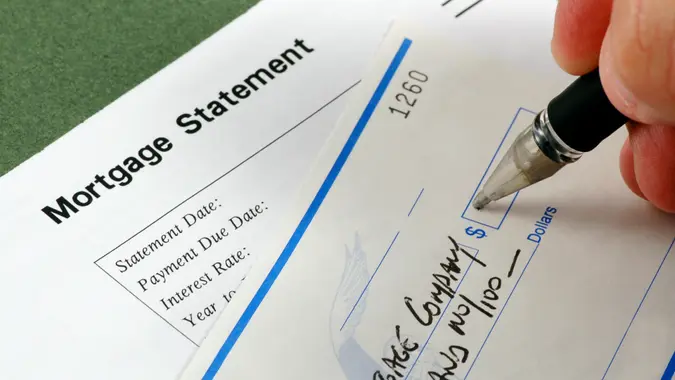2 Ways To Save Time and Money on Your Mortgage, According To Money Expert Preston Seo

Commitment to Our Readers
GOBankingRates' editorial team is committed to bringing you unbiased reviews and information. We use data-driven methodologies to evaluate financial products and services - our reviews and ratings are not influenced by advertisers. You can read more about our editorial guidelines and our products and services review methodology.

20 Years
Helping You Live Richer

Reviewed
by Experts

Trusted by
Millions of Readers
The average American spends more on housing than any other expense. If you have a mortgage, paying off that debt will free up a lot of your budget and give you more control over your finances.
In a recent video on Instagram, personal finance influencer Preston Seo discussed two tips for paying off your mortgage faster. Read on to learn more about his approach to save time and money on your mortgage.
Make Biweekly Payments Instead of Monthly Payments
Mortgage lenders typically require you to make a payment once per month. However, many lenders also offer the option to make multiple payments as long as they add up to at least your minimum monthly payment amount.
Seo recommended paying your mortgage once every two weeks instead of making one monthly payment. Each biweekly payment should equal half your usual monthly payment amount. It might sound like making one monthly payment or biweekly half payments is essentially the same thing, but this slight shift can actually make a big difference.
As Seo explained, paying biweekly means you make 26 half-mortgage payments per year, or 13 whole mortgage payments. That’s one more payment than you’d pay with monthly payments (only 12) each year.
You might not notice the difference month to month, but by the end of the year, you will have made significant extra progress toward paying off your mortgage. Check with your lender to ensure it allows biweekly payments. For example, U.S. Bank does not accept biweekly payments but does allow you to make extra payments after paying monthly.
Sample Payment Comparison
In Seo’s video, he gave the example of a $300,000 principal loan balance with a 7% annual interest rate over 30 years. The monthly payment on this mortgage would be $1,995.91, and you would pay $418,526.69 in interest over the life of the loan.
If you switched to biweekly payments, you would pay $997.95 every two weeks. Your total interest payments would be $311,876.19 — more than $100,000 less than the total interest when paying monthly. The simple swap to biweekly instead of monthly payments would save you over $100,000.
This trick is effective because months are longer than precisely four weeks. Although biweekly and monthly payments sound equivalent, you actually put more money toward your mortgage when making biweekly payments. It adds up to an entire extra monthly payment.
The extra 13th mortgage payment you make paying biweekly is broken up over the year, so it’s less taxing on your budget. The slight increase is enough to save you thousands over the course of your mortgage, and you’ll pay off the loan seven years earlier.
Increase Your Payments by 2% Each Year
Seo’s other mortgage tip is increasing your total payment amount by 2% yearly. For example, if you pay $20,000 in mortgage payments this year, increase your total payments to $20,400 next year.
Paying just a little bit more each year will save thousands in interest payments and help you pay off your loan faster. Since 2% is a small increase, “you’re not going to feel it,” according to Seo.
Sample Comparison
Say you took out a 30-year mortgage for $240,000 at 7%. If you made only monthly payments and never increased your payment amount, you’d pay $334,821 in interest over the life of the loan. If you increased your payments by 2% yearly, you’d pay only $226,599 in interest. You’d save over $108,000 in interest.
Increasing your payment amounts would enable you to pay off the loan eight years earlier in this example.
One Exception to Increasing Your Payments
If your mortgage rate is below 4%, Seo recommended not rushing to pay off your loan. “Inflation is working for you,” he said. You may be able to earn more money in other investments, like the stock market, than you would save by paying off your mortgage faster.
Small Changes Can Make a Big Difference
Even little changes to your mortgage payments can make a big difference over 20 or 30 years. If neither of the above tips seems feasible for your budget, you can still pay extra money toward your mortgage whenever possible. Don’t underestimate the difference that small additional payments can make in terms of saving you money in the long term.
More From GOBankingRates
 Written by
Written by  Edited by
Edited by 


























